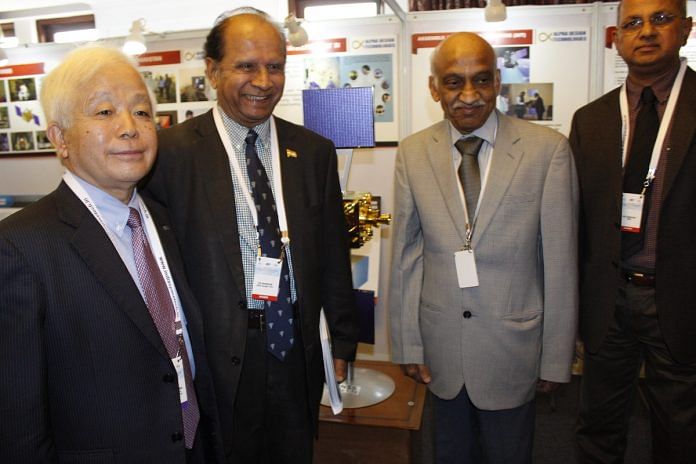Space agency chief Naoki Okumura says Japan & India may be in competition, but cooperation on moon mission will help fend off other countries.
New Delhi: The Japanese Aerospace Exploration Agency (JAXA) is planning human expeditions to the moon in the next decade with some help from India, its president Naoki Okumura said Monday.
JAXA is exploring a partnership with the Indian Space Research Organisation (ISRO) to expand space infrastructure and research, with the two space agencies having recently signed a Memorandum of Understanding to collaborate on future lunar missions.
The proposed collaboration was discussed during Prime Minister Shinzo Abe’s visit to India in September.
Speaking on the sidelines of the ‘Indian Space Programme: Trends and Opportunities for Industry’ seminar, hosted by FICCI and ISRO in New Delhi, Okumura told ThePrint that the moon mission was among the several projects JAXA was working on at the moment, and that ISRO would be an ideal partner for it.
“We are thinking of human exploration of the moon in the 2020s; I hope as early as possible. We also plan on launching GOSAT-2, which can help the IPCC (Intergovernmental Panel on Climate Change) monitor climate change,” Okumura said.
“To achieve this goal, we need cutting edge technology from industries, and that’s why a partnership like this can help. This is a strategic relation. India and Japan might be in competition with each other, but we must increase cooperation to attack other competitive countries and industries,” he added.
JAXA is also working on a flagship launcher, the H3, which it plans to launch in 2020. “It might be competitive with ISRO,” Okumura joked.
Climate change and pollution
Okumura acknowledged the need for global cooperation in dealing with climate change.
“We have lots of data obtained by our satellites. We will try to combine our data with ISRO’s data to get new knowledge, which can be useful for our countries,” he said.
The Japanese satellite GOSAT-1, which is currently in orbit, is used to monitor greenhouse gases. “From this data, we can observe greenhouse gases very precisely, which might be useful to the Indian people and ISRO. This is also a kind of collaboration,” Okumura added.
Asked about the possibility of using space technology to deal with the problem of air pollution in India, he said Japanese satellites are used to monitor forest fires, which could be modified in some form to observe crop burning.
ThePrint is media partner for ‘Indian Space Programme: Trends and Opportunities for Industry’, a two-day international seminar being hosted by ISRO and FICCI at The Ashok, New Delhi.



